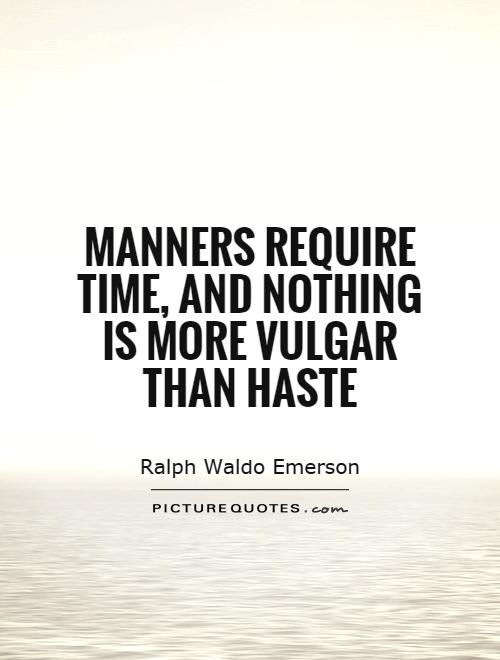Manners require time, and nothing is more vulgar than haste

Manners require time, and nothing is more vulgar than haste
Ralph Waldo Emerson, a renowned American essayist, lecturer, and poet, was a firm believer in the importance of manners and etiquette in society. He believed that manners were a reflection of one's character and values, and that they required time and patience to cultivate. In his essay on manners, Emerson famously wrote, "Manners require time, and nothing is more vulgar than haste."Emerson's statement highlights the idea that true manners cannot be rushed or forced. They must be developed over time through practice, observation, and self-reflection. Rushing through interactions or behaving impulsively can lead to misunderstandings, hurt feelings, and a lack of respect for others. In contrast, taking the time to consider one's words and actions, and to treat others with kindness and courtesy, is a sign of maturity and thoughtfulness.
Emerson believed that manners were not just about following a set of rules or conventions, but about showing genuine respect and consideration for others. He saw manners as a way of expressing one's inner values and beliefs, and as a means of fostering harmony and understanding in society. By taking the time to cultivate good manners, individuals could create a more civil and compassionate world.
Emerson's emphasis on the importance of manners in his writings reflects his broader philosophy of self-reliance and individualism. He believed that each person had the power to shape their own destiny through their thoughts and actions, and that by cultivating good manners, individuals could create a more harmonious and fulfilling life for themselves and those around them.












 Friendship Quotes
Friendship Quotes Love Quotes
Love Quotes Life Quotes
Life Quotes Funny Quotes
Funny Quotes Motivational Quotes
Motivational Quotes Inspirational Quotes
Inspirational Quotes